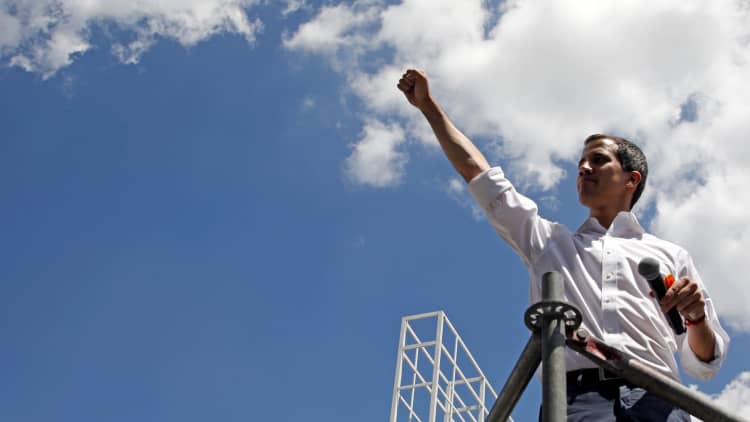Venezuela's opposition will meet with representatives of President Nicolas Maduro in Barbados this week.
The talks will be mediated by Norway once again, after negotiations between the political rivals in May failed to resolve a deepening political crisis.
The South American country is in the midst of one of the Western Hemisphere's worst humanitarian crises in recent memory, with some 4 million people having fled the country since 2015 amid an economic meltdown.
Juan Guaido — who declared himself to be the country's rightful interim leader in January — did not specify a date for the renewed dialogue but confirmed the talks would be moved to Barbados, after previously being held in Norway's capital city of Oslo.
"In response to the mediation of the Kingdom of Norway, (the opposition) will attend a meeting with representatives of the usurper regime in Barbados, to establish a negotiation on the end of the dictatorship," Guaido said in a statement on Sunday.
The leader of the National Assembly, who has been recognized as Venezuela's legitimate interim president by more than 50 countries since late January, said that any talks must lead to a solution of the crisis and must not be used by Maduro's government to buy time.
"The Venezuelan people, our allies and the world's democracies recognize the need for a truly free and transparent electoral process that will allow us to surpass the crisis," Guaido's office said, Reuters reported.
Norway's government said in a statement that talks would take place over the coming days. Maduro's Communications Minister Jorge Rodriguez posted the statement by Norway's government on Twitter on Sunday.
Earlier this month, Guaido said there were no plans to hold talks with Maduro's administration, following the death of a Navy captain in custody over an alleged coup plot. The death of Rafael Acosta Arevalo, a 49-year-old officer, sparked a wave of international condemnation.
However, Guaido said at the time that the opposition would be prepared to "officially communicate" with Maduro.
What is going on in Venezuela?
A protracted political stand-off has thrust the oil-rich, but cash-poor, country into uncharted territory — whereby it now has an internationally-recognized government, with no control over state functions, running parallel to Maduro's regime.
Guaido assumed a rival interim presidency in January, citing Venezuela's constitution, and denounced Maduro's government as illegitimate after he secured re-election last year in a vote widely criticized as rigged.
However, Maduro has refused to cede power. And, crucially, he still has the broad support of the military.

Since 2013, the cumulative contraction of GDP (gross domestic product) in Venezuela has been 44.3%, while cumulative inflation over the same period skyrocketed up to 2.8 million percent at the end of January.
The minimum wage for the average citizen in Venezuela, which is estimated to be roughly $7 a month, would not be enough to cover even 5% of the basic food basket for a family of five people, the UN said in a report published last week.
Maduro instituted attempted reforms in August 2018 that cut five zeroes off the currency and prices. The largest note in circulation had been 500 bolivars, which is now reportedly not enough to buy a piece of candy.


